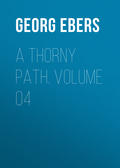
Georg Ebers
The Elixir
These observations showed the Court apothecary that Frau Vorkel had, despite her want of intelligence, grasped to a certain extent the importance of his discovery; while this pleased him in a way, it also made him uneasy, therefore he made her swear on the crucifix that so long as she lived she would never impart to any living soul, his son excepted, what she had that evening experienced.
Then Herr Ueberhell went back to his search for the unknown element which had given to his son's elixir the power that had been exhibited in such wonderful fashion. But he did not succeed in finding the right ingredient, for as often as he called Frau Vorkel to come and inhale the new mixture, she gave such plausible and politic answers to his dangerous questions that he could be by no means sure of her absolute truthfulness. Then too the operations progressed slowly because that day at noon his finger had been badly cut by the bursting of a glass retort. So presently he ceased work for a while and insisted that Frau Vorkel should take the phial in her own hand and inhale its contents once more, because it pleased him to try the power of the elixir.
With an amused smile he asked her if she used the great quantities of wool, which she so constantly demanded, for no other purpose than to knit socks for him.
The phial trembled in the hand of the housekeeper, and before she could help it her response had passed her lips:
"You have all the socks that you need and it is surely no great crime for me to knit a few pairs to warm the feet of your assistant, that poor, silent worm who stands downstairs the livelong day in the cold shop."
Despite this reply Herr Ueberhell only laughed and continued the inquisition gaily. He next wished to know who was dearer to the heart of the housekeeper, the assistant or her late husband, to which she rejoined "Why should I lament Vorkel? He was a bully, who never could learn how to cut out a coat, and always stole his customers' cloth." At that moment there was an ominous crash on the floor, and a powerful odour filled the laboratory; the phial had slipped from the hands of the frightened woman.
What happened after that Frau Vorkel even in her old age shuddered to recall. How it could have been possible for the amiable and pious Court apothecary to give utterance to such objurgations and invectives, such sacrilegious curses and anathemas, and how she, a respectable and proper woman, of good Leipsic people, ever could have allowed herself to attack any one, least of all her excellent master, in such abusive language were problems she could never solve.
Yet they must not be censured for their use of Billingsgate, for the strong aroma of the elixir forced them to tear aside the veil which in Leipsic, as elsewhere, clothes the ugly truth as with a pleasing garment, and to lay bare all the rancour that filled their hearts.
Later when she thought about the breaking of the phial, the conviction grew upon her limited intelligence that this accident would perhaps prove in the end to be the best thing that could have happened, not only for her but for all mankind. To her excellent master, at least, the Elixir of Truth proved fatal all too soon; the intense excitement of that night had shaken him so cruelly that before the day dawned the feeble flame of his life had flickered out.
Frau Vorkel found him dead the next morning in his laboratory. He must have gone thither to seek once more for the lost substance after she had helped him to bed. Before he had begun his work he must have wished to encourage himself by a glance at the portrait of his grandchild, for as she opened the door the sheet of paper with the red crayon drawing was wafted from the open chest, beside which her master had fallen, and like a butterfly, fluttered down upon the heart that had ceased to beat several hours before.
Six months after the death of the Court apothecary, Melchior Ueberhell returned home and Frau Vorkel or, as she must now be called, Frau Schimmel, was the only person to whom he wrote to announce the hour of his arrival in Leipsic.
In his letter the young doctor begged her to undertake the responsibility of engaging a man servant and a kitchen maid for him, and of seeing that there was a fire laid on his hearth to welcome him. He also asked "his faithful old friend" to nail up before the furnace of the laboratory on the first floor the brass triangle which the messenger, who brought the letter, would give to her. It was to be hung with the face, bearing the numerals and the figures of animals, towards the outside.
This news threw Frau Schimmel into a great state of excitement and at the appointed hour everything stood ready for the reception of the future occupants of the Ueberhell house.
Doctor Melchior and his family waited in Connewitz for the sun to set that he might enter his native town after it was dark and yet before the city gates were closed; for it was characteristic of his retiring nature to wish to avoid exposing himself and his beautiful wife and child to the vulgar curiosity of the people. These two had made the journey in a litter carried by mules.
As it was just the time for the Easter fair and many strangers were arriving in Leipsic the travellers passed through the Peterstrasse, across the market-place and entered their newly built house without attracting any attention.
It was too dark for them to see the statue of Minerva on the peak of the high gable and the sun-dial on its face with the circle of animals, but the lighted windows on the ground-floor and in the first story gave the house a hospitable air.
Frau Schimmel who had long been awaiting their arrival went out to meet them and the new man servant held the lantern so that they could see her curtseys.
"May the holy saints bless your homecoming!" the old lady called out, and Melchior felt himself choke at the host of sweet memories evoked by this greeting—of how his mother used to fold his hands and teach him to pray to the holy patrons of the house, of the sad hour when he had received the news of his father's death—and to his astonishment he felt the warm tears running down his cheeks, the first he had shed for many years and almost before he knew it himself, he had caught Frau Schimmel to his heart and kissed her tenderly.
Then he turned to his slim young wife, who with the boy was standing behind him, and presented her to the old housekeeper: "The dearest treasure that I won in Italy! I commend her to your love."
Frau Schimmel raised the beautiful Italian's hand to her lips and lifted the little boy and hugged him. Melchior in the mean while hurried to the entrance door, there he bowed three times and solemnly lifted aloft his arms toward the evening-star that was just showing itself above the roof of a house across the market-place.
The old housekeeper noticed this, and rejoiced for she thought that Melchior was returning thanks to the holy saints for a safe journey, but she was disillusioned when she heard him open his lips and cry towards heaven an invocation which was neither German nor Latin, for she knew the sound of the latter tongue, having heard it so often at mass, but a combination of strange sounding words more like those that she used to hear her late master muttering over his work in the laboratory, with his son's letter before him. It was certainly no Christian prayer and her heart sank within her. When the doctor had ended the ceremony which for all she knew might be an invocation of evil spirits, and entered the house with his wife and child, she went up to him and without a moment's indecision made the sign of the cross on his breast and another on the curly head of the child. Melchior laughed at her but did not rebuff her. Soon the travellers were seated about the neatly laid table in their own house and Frau Schimmel had her reward in seeing Melchior enjoy the home- made dishes. And little Zeno—for that was the name of the Court apothecary's grandchild—drink the good milk and munch the butter cakes which she had baked to celebrate their arrival. But the young wife hardly tasted anything.
Did not the food please her? Perhaps she was accustomed in Italy to a different way of cooking? "Other nations, other customs."
But who could feel annoyed with that heavenly creature?
Frau Schimmel was of the opinion that she had never seen any one to equal her, and could not bear to take her eyes off her. Yet the appearance of the wife of her old favorite filled her with forebodings, and suddenly, though she was by no means superstitious or given to presentiments, she seemed to see Frau Bianca—so the young Italian was called—lying on her bier, a light veil over her, and a wreath of lilies-of-the-valley on her raven hair. A sad quiet face!
Frau Schimmel's vision must have been caused by the young wife's excessive paleness. "White as snow, black as ebony" fitted her, as well the beauty of the fairy tale, only "red as blood" was wanting. She was also as tall and slender as the lilies in the little garden that the Court apothecary had owned outside the Petersthor.
After supper Frau Schimmel helped the mother to bathe the little Zeno and to put him to bed, and Melchior also assisted at the performance. As the old lady looked from mother to child a great pity filled her heart for the dear son of her late master who had staked his happiness on a creature so ethereal that the first wind might blow her away; such delicate perfection as that, if her experience did not deceive her, was hardly adapted to the needs of an everyday German husband. But then did Melchior look like such an one? No.
Again she felt a cold shiver go down her back, for Melchior had taken the bath sheet and was holding it in front of him waiting to wrap the child in it as it was taken out of its tub, and it seemed to her as if he had on a shroud and his bloodless emaciated face with his black hair and moustache looked ghostly over the top of it.
It annoyed her that she should have these stupid, sad thoughts on the occasion of such a happy home coming!
She did her best to drive them away and the child helped her, for it, at least, looked lively enough as it sat in the warm water, and kicked, and splashed, and laughed, and cooed, calling to its parents and then to Frau Schimmel. When it tried to pronounce her name, her heart overflowed and she answered absently, for she was saying a silent Paternoster for the health and welfare of this blessed child who somehow seemed even lovelier than Melchior had once been, though in his time she had considered him "the sweetest baby that had ever lived."
When the child was in bed the mother folded its hands and murmured what Frau Schimmel knew to be a prayer, but the father touched, its forehead and the place about the heart with an essence, speaking at the same time some incomprehensible words. Whatever they meant, they seemed to agree well enough with the incomparable child.
The young wife was tired after her long journey and went early to bed, and when the housekeeper was finally left alone with Melchior, he begged her to tell him how things had gone with his father, after his departure.
The son of her late master had, then, brought back from Italy his tender and affectionate heart, however stern and anxious his long and colourless face might seem; and when he heard of the old man's longing to see him, and death, his eyes were wet with tears.
He interrupted the course of her narrative but seldom; when she came to his father's last hours, however, and the success of the experiment which had been made on her with the elixir, he plied her with question upon question until he was satisfied as to what he wished to know. Then he suddenly stood still in the middle of the room and lifting his eyes and arms on high cried aloud, like one in an ecstasy:
"Eternal Truth, holy Truth! Thy kingdom come!"
These words went through Frau Schimmel like a knife, and as Melchior stood there looking up at the ceiling as if he expected it to open and disclose to him a sight of Heaven, he seemed so great, and unapproachable, and apart, that she feared him, though in years gone by she had tucked his luncheon into his knapsack before sending him off to school, and tremblingly she yielded to his will as she had done before to his father's and swore again a solemn oath never to reveal what she might see or hear concerning the elixir.
This vow oppressed Frau Schimmel and she breathed more freely when he began to talk about things within the range of her comprehension, about the details of the housekeeping, and the laboratory on the second floor with the big furnace. He must find an assistant who would be silent and discreet and Frau Schimmel knew of one whom she could recommend, for her husband did not enjoy his newly acquired leisure; he had been so used to blowing a furnace and decocting medicines that he could not give up the occupation and consequently she could not roast so much as a pigeon without having his grim and blear-eyed visage peering over her shoulder.
The sensible woman foresaw that idleness would soon render the old bridegroom discontented, and Doctor Melchior, who remembered the silent man and his skilful hands, was very easily persuaded to give him a trial. At the back of the house there was a cheerful suite of rooms where the housekeeper and the apprentices had formerly lived. Melchior now put this apartment at the disposition of the old couple. Frau Schimmel would lend her aid to his wife, for Frau Bianca understood neither German nor the management of a German household, while from Herr Schimmel he anticipated the best particularly as he—the doctor—meant to devote himself at first entirely to the discovery of a remedy for his wife, whose condition filled him with the deepest apprehension.
The new laboratory was presently the scene of the most zealous labours, and Herr Schimmel was delighted with his new position, for no apothecary and chemist had ever before had such a well-fitted furnace and such delicate scales and instruments to work with; and if he did not understand what was the end of so much weighing and fusing and distilling, or what the remedies were that the doctor was always decanting from the boiling liquids, yet the occupation made the long summer days pass most pleasantly, for he had none of that love of the open air that most Leipzigers bring into the world with them.
Since his apprenticeship, and a whole lifetime had passed since then, he had left the apothecary shop only twice a year to take a holiday, and on none of these occasions had he ever seen green trees, for his "outings" as he called them, fell, according to his own wish, on the festival of the "Three Kings" in January, and on the twenty-seventh of March which was his saint's day, his name being Rupert.
Of the eighty holidays that lay behind him—all of which he had spent in going to see a sister who was married to a miller and lived in Gohlis— nine and thirty times it had rained, and forty-one times it had snowed. In consequence of this "a walk in the fresh air" always suggested to his mind, damp clothes, wet feet, ruined shoes, a cold in the head, and an attack of indigestion—the result of his sister's greasy cooking. His wife, too, preferred the inside of the city walls, "where" as she was so fond of saying, "you know where you are."
Thus even in summer Herr Schimmel was always on hand to help the doctor, nor had he cause to complain of being over worked, for the master seemed as fond of a walk in the open air as the assistant was averse to one, and when May came and the fruit trees were in blossom, when the delicate green leaves of the beeches burst from the bud, and the oaks shed their dry brown foliage in order to deck themselves out in young green, and the dandelions embroidered the fields with gold and then sprinkled them over with silver tissue, when the cowslips and daisies and violets and their spring companions in purple and yellow appeared, and the larches on the banks of the Pleisse turned green, when the nightingale sang and rejoiced in the woods, then Doctor Melchior Ueberhell rarely spent a sunny afternoon at home.
With his beautiful young wife on his arm he wandered through the lovely Laubwald—that precious possession of the city—and though he had often said while in Italy, where it is dryer and the foliage sparser than in Germany, that there was nothing so beautiful as the abounding brooks and the dense greenery of his native forests, it gave him sincere joy, that spring, to have his opinion confirmed and to see that his dearly loved wife cared as much for the German woods as he did.
When in their walks they encountered other burghers, all eyes rested on the handsome pair, for if Melchior were thin, his figure was tall and his features good, and there was a strange charm in his big, dark, eyes that seemed to find more in the woods than was visible to others, moreover the black clothes of his profession sat as well upon him as did his wife's white dresses and kerchiefs of costly stuffs upon her. These she was fond of relieving by a bit of light blue, her favourite colour. The slim young Italian, with her bowed head and beautiful pale face framed in its black hair, seemed like an elf who had gone out in her light dress to dance the May dance in the moonlight and had decked herself with forget- me-not and gentian.
Whoever saw her felt glad, for it seemed to him as if he had met with a piece of good fortune, but no one sought to make her acquaintance, although the doctor had not omitted to take her, soon after their arrival, to call upon his relatives and the dignitaries of the city. People had asked them at first to dine, but as Melchior always refused because of his wife's delicate health, they did not press the matter; for no one could talk with her as she understood no German, while all who heard her light cough felt that the doctor was right to guard his fragile treasure so carefully.
When the few matrons who visited her called upon her, instead of finding her in the kitchen or the cellar, they found her lying upon the sofa with a book or her guitar in her hands, or perhaps playing with her little boy, and the amiable ones among them explained it by her pale face and delicate air, but the severer ones said that such idleness was the Italian custom and they pitied the doctor.






